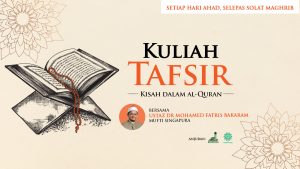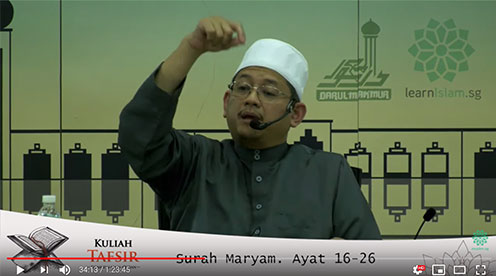This article is a summary of takeaways from Ustaz Dr Mohamed Fatris Bakaram’s Tafsir Lecture at Darul Makmur Mosque on 8th December 2019.
Q&A Session for verses covered on 1st December 2019
In the previous session, we extracted Lessons from the Life of Sayidatina Maryam AS, based on the Tafsir of Surah Maryam [19:16-23]. In these verses, Allah SWT tells us about Sayidatina Maryam AS journey as she went through pregnancy and childbirth.
فَأَجَاءَهَا الْمَخَاضُ إِلَىٰ جِذْعِ النَّخْلَةِ قَالَتْ يَا لَيْتَنِي مِتُّ قَبْلَ هَـٰذَا وَكُنتُ نَسْيًا مَّنسِيًّا
Then the pains of labour drove her to the trunk of a palm tree. She cried, “Alas! I wish I had died before this, and was a thing long forgotten!” [19:23]
Q: Sayidatina Maryam AS is someone who is raised in ranks and honoured as an inhabitant of Paradise. How could someone like her have had such negative thoughts? Shouldn’t she have known better? Doesn’t this verse portray her in a negative light?
On First Thoughts
A: It is part of the Fitrah, or innate nature, of human beings to have thoughts and desires in your mind. Oftentimes, these thoughts may not be pleasing to you. Your first thoughts which emerge in your mind at any situation are a trial for you. While they may be displeasing, they are not sinful on their own. What determines whether they become sinful or not is what you do as a result of these negative thoughts.
Previously, I gave an example of a man who, by accident, glances at a woman wearing revealing clothes. This man had not been intentionally looking to please his desires. Yet, he is unable to control or avoid what he comes across in his daily life. Certain thoughts may come up in his mind upon seeing the woman. What does he do in such a situation?
In a hadith, the Messenger of Allah ﷺ said,
لاَ تُتْبِعِ النَّظْرَةَ النَّظْرَةَ فَإِنَّ لَكَ الأُولَى وَلَيْسَتْ لَكَ الآخِرَةُ
“Do not give a second look, (because) while you are not to blame for the first, you have no right to the second.”
From this hadith, we learn that you will not be blamed for the first accidental glance. You cannot, however, act upon the initial thoughts in your mind by going back and taking another peek- because the looks that follow will be neither accidental nor unavoidable. Likewise, you will not be blamed for the unavoidable. However, failing to stop yourself from doing something that you do have control over will get you in trouble.
In another hadith, when asked for advice, Prophet Muhammad ﷺ had said,
لاَ تَغْضَبْ
Do not get angry
He ﷺ did not mean that we, as human beings, should never get angry. That is impossible. It is part of our Fitrah, our human nature, to have feelings of anger. What this hadith means is that, when anger does arise out of whatever situation that occurs, we need to be in control of our anger. We cannot allow our anger to drive us to do deeds which harm others such as using foul language or becoming violent. While it is ok to feel anger, it is up to us to manage how we act while in the state of anger.
To further explain this concept, we can look at Verse 284 of Surah Al-Baqarah:
وَإِن تُبْدُوا مَا فِي أَنفُسِكُمْ أَوْ تُخْفُوهُ يُحَاسِبْكُم بِهِ اللَّـهُ
Whether you reveal what is in your hearts or conceal it, Allah will call you to account for it. [2:284]
When this verse was revealed, the companions of Prophet Muhammad ﷺ got worried. They recognised that if whatever is hidden in our hearts, even that which is neither expressed in words nor actions, is also held accountable, then surely, they will be in a dire situation. They consulted the Prophet ﷺ expressing their concern, asking him about the thoughts that often emerge in their minds which worry them.
Allah SWT then revealed the following verse:
لَا يُكَلِّفُ اللَّـهُ نَفْسًا إِلَّا وُسْعَهَا
Allah does not burden any soul with more than it can bear. [2:286]
From this verse, it is clarified that Verse 284 was not referring to the initial thoughts that appear in our hearts and mind as part of our Fitrah. Allah will not hold us into account for that which we have no control over. Rather, verse 284 refers to the thoughts concealed in our minds which we acknowledge to exist and yet fail to supress.
For example, thoughts of envy may emerge when you see an acquaintance’s success. The right thing to do is to catch yourself thinking those thoughts, then immediately discard them, telling yourself that all goodness comes from Allah and goes to whomever Allah wills it for. When you do so, you will not be held accountable for your initial thoughts. However, if you allow that envy to stay in your mind and fester into hatred and resentment in your heart, only then, whether or not you express these thoughts, will you be held accountable for them.
Going back to the story of Sayidatina Maryam AS when she expressed her thoughts of despair, we see that she did not act upon her thoughts by doing anything that was sinful or disobedient to Allah SWT. She did not ask for death, as had been forbidden in a hadith of the Prophet ﷺ. Instead, despite the impending difficulty of her task and her initial thoughts, she carried on living to the best of her ability, boldly taking on the trial, knowing that it comes from Allah SWT and that ease and aid will come from Him SWT alone.
On the Vulnerability of Pregnant Women
The next lesson we can take from this verse is that the pregnancy period of a woman, especially in the days before childbirth, is the most vulnerable period of her life. Sayidatina Maryam is a noble, honourable woman. She was raised by a prophet and honoured both through her parents’ supplications and her mother’s vow of her. She wasn’t someone with a weak faith. And yet, she was still a woman. She too had struggles with her emotions. If someone like Sayidatina Maryam, a woman promised paradise, had such emotional turmoil during childbirth, what would you expect the women of today? Our mothers, sisters, wives and daughters are human too.
Dear husbands, potential fathers and existing fathers, have compassion for your wives throughout their difficult period of pregnancy. Be understanding of the struggle of emotional burden that an expectant mother is facing and be a pillar of support for her.
As mentioned in Surah Ar-Rum, verse 21:
وَمِنْ آيَاتِهِ أَنْ خَلَقَ لَكُم مِّنْ أَنفُسِكُمْ أَزْوَاجًا لِّتَسْكُنُوا إِلَيْهَا وَجَعَلَ بَيْنَكُم مَّوَدَّةً وَرَحْمَةً ۚ إِنَّ فِي ذَٰلِكَ لَآيَاتٍ لِّقَوْمٍ يَتَفَكَّرُونَ
And of His signs is that He created for you from yourselves mates that you may find tranquillity in them; and He placed between you affection and mercy. Indeed in that are signs for a people who give thought. [30:21]
Your spouses were created for you so that you may find comfort and tranquillity in them. As such, it is expected of you, as a husband, to be the source of emotional strength and comfort for your wives. To future fathers, strive to always be present for your pregnant wives. Throughout pregnancy, they are requiring your emotional support, supplications, physical touch, encouragement, aid, kindness, sympathy, care and concern.
Do not leave your wives alone at home to cope with their struggles by themselves. Some men have hobbies of going on long-distance trips alone, be it for fishing or biking, with their friends. Others go on Dakwah trips to spread the message of Islam abroad. During the period of your wife’s pregnancy, postpone or skip those trips. Prioritise your service to your family before you head out to serve others.
The reason why I bring this topic up is because I would like to see our community become a Community of Grace. Be a community of men with chivalry, with husbands who are gentlemen- just as our Prophet Muhammad ﷺ had been. Prophet Muhammad ﷺ was known for his gentleness and love for his family. He had beautiful character and showed extraordinary kindness, care and concern not only to the public, but especially to his wives and his children. It pains me to see fathers and husbands who fail to become gentlemen at the moment when their wives are most in need of them.
The child that your wife is carrying is not hers alone, he is also yours. The task of carrying him should be shared between the two of you. Allah SWT has determined the pregnancy period for human beings to be nine months. This long duration is given to enable us, as husband and wife, to make the necessary preparations required before we become parents to a child.
I speak from my own experience and shortcomings as a young father. Your children are my children too. I’m sharing because I want to see us as a community of kindness. Scientific studies have shown that a child who is born from a mother with a disturbed emotional state throughout pregnancy has symptoms such as a lowered immune system. If, as a father, you are concerned for the health of your child, then be there to support the mother of the child.
Take examples from the story of Sayidatina Maryam AS, in seeing how Allah SWT shows us the importance of emotional support during difficult times.
Continuation of the Story of Maryam AS
Verses Explained
فَنَادَاهَا مِن تَحْتِهَا أَلَّا تَحْزَنِي قَدْ جَعَلَ رَبُّكِ تَحْتَكِ سَرِيًّا
Then he called her from beneath her: “Do not grieve; your Lord has placed a stream beneath you. [19:24]
Sayidatina Maryam AS was comforted by a voice that came from beneath her that there was a stream nearby, for her to hydrate herself after the ordeal of childbirth.
There are two opinions regarding whom the voice belonged to. The first opinion states that it was Angel Jibrail AS, instructing her from below as she was on an elevated land. The second opinion, that of Iman Ibn Jarir al-Tabari and some others, states that the voice “from beneath her” was in fact the voice of Prophet Isa AS. It was a miracle of Prophet Isa AS that he was able to speak from birth.
وَهُزِّي إِلَيْكِ بِجِذْعِ النَّخْلَةِ تُسَاقِطْ عَلَيْكِ رُطَبًا جَنِيًّا
And shake toward you the trunk of the palm tree; it will drop upon you ripe, fresh dates. [19:25]
Sayidatina Maryam AS needed to replenish her energy after childbirth, and thus she was instructed to shake a palm tree for ripe, fresh dates to eat.
فَكُلِي وَاشْرَبِي وَقَرِّي عَيْنًا ۖ فَإِمَّا تَرَيِنَّ مِنَ الْبَشَرِ أَحَدًا فَقُولِي إِنِّي نَذَرْتُ لِلرَّحْمَٰنِ صَوْمًا فَلَنْ أُكَلِّمَ الْيَوْمَ إِنسِيًّا
So eat, drink and cool your eyes. Then if you see any human being, say (to him), “I have vowed a fast (of silence) for the All-Merciful (Allah,) and therefore, I shall never speak to any human today.” [19:26]
In this verse, the phrase ‘Qarri ‘ainaa’ was used, meaning “Cool your eyes”. This Arabic expression refers to the comfort of the heart. When someone is said to have cooled eyes, they have a heart that is calm and at peace. This expression can also similarly be seen in Surah Al-Furqan, Verse 74, where we are taught to say:
وَالَّذِينَ يَقُولُونَ رَبَّنَا هَبْ لَنَا مِنْ أَزْوَاجِنَا وَذُرِّيَّاتِنَا قُرَّةَ أَعْيُنٍ وَاجْعَلْنَا لِلْمُتَّقِينَ إِمَامًا
“Our Lord, grant us from among our wives and offspring comfort to our eyes and make us an example for the righteous.” [25:74]
In the verses of Surah Maryam above, we can see how Allah SWT brought calmness and strength to Sayidatina Maryam AS through kind comforting words and sustenance to replenish her energy after childbirth. She was also instructed to vow her silence to whomever she meets, regardless of whatever was said to her.
Key Takeaways
On Emotional Support
In verse 24, it was said to Sayidatina Maryam to stay calm and not grieve. As previously mentioned, it has been scientifically proven that a woman’s hormones become imbalanced during pregnancy. After childbirth, a mother might become even more emotionally distraught. She is concerned about her ability to carry out her role as a mother, she may be fatigued and worried about what is to come. Oftentimes, even though a mother had no problems managing her emotions during pregnancy, her emotional issues may arise post-childbirth. For some people, this is where post-natal depression kicks in.
The role of a husband is to be a source of emotional strength for her- be patient, be a listening ear and be willing to learn. Just as Sayidatina Maryam AS was given words of encouragement and support to uplift her spirit, as a husband, you are expected to do the same for your wife after labour.
On Putting in the Effort
If Allah SWT had willed, He SWT could have easily let dates appear in front of Sayidatina Maryam AS without her having to put in any effort. Nothing is impossible for Allah SWT. However, even in her already weakened and fatigued state after childbirth, she was instructed to shake the palm tree to retrieve the fruits. The lesson here is the importance of putting in your effort.
Nobody is spared from making effort to achieve what they want from Allah SWT. Sayidatina Maryam AS, an honoured woman of Jannah, could have gotten whatever she had asked for, and yet, she knew that supplications alone are insufficient if not coupled with hard work. A palm tree is not an easy tree to shake. A full-grown strong man might not be able to shake a palm tree until its’ fruits fall. And yet, even in her state of weakness, Sayidatina Maryam AS had to work for it. She did not just make supplication and wait, expecting Allah to provide for her. Instead, she trusted Allah SWT to provide for her and put in the effort to earn the sustenance. Nobody should think that just making supplication is enough to get them what they want and need in life.
On that note, we need to remember that even with the importance of relying on her husband for emotional support in her weakened state, a mother is not spared from being her own source of strength. She may be weakened and exhausted initially; However, she should not be allowed to remain in a weak state. She must put in effort to get better and do her part to recover and regain strength, not just expect to be waited upon.
On Keeping Silent
As mentioned in verse 26, Maryam AS was instructed to remain silent regardless of what was spoken to her. Sheikh Mohamed Sayyid Tantawi in his book gave 2 reasons for this:
- (1) Allah has arranged for Prophet Isa AS to answer the questions instead of Sayidatina Maryam AS. This act of letting the new-born baby speak on her behalf would highlight the miracle and absurdity of the situation, better than her explaining it herself.
- (2) Allah knows that people with sick hearts will not listen or be convinced regardless of what is said to them. In her state, there would have been no good answer to any questions thrown at her. There was no precursor to her situation. What had happened to her was and is beyond the scope of human logic and imagination. Nobody would have believed her explanations or excuses. In that state, the best response would be to not respond.
An example of the importance of keeping silent can be seen in the life of Imam Al-Shafi’i, a great scholar and a linguist. Many of the poems he had written emphasised how he would refuse to answer the questions of the ignorant. These were people who questioned not for the sake of understanding or discovering the truth, they ask questions in order to challenge you, to be heard but not to hear. The best response to them is to remain silent. This is supported by Surah Al-Furqan, verse 63:
وَعِبَادُ الرَّحْمَٰنِ الَّذِينَ يَمْشُونَ عَلَى الْأَرْضِ هَوْنًا وَإِذَا خَاطَبَهُمُ الْجَاهِلُونَ قَالُوا سَلَامًا
And the servants of the Most Merciful are those who walk upon the earth easily, and when the ignorant address them [harshly], they say [words of] peace [25:63]
A word of advice, especially in this age of social media, is to not rush into reacting or responding to people. Don’t be tempted to respond and react to every single comment given to your posts. Whenever a conflict or misunderstanding occurs, pause before you react and remember this:
- (1) If you had been right, there is no need to prove it. The ignorant will keep criticising you and would not accept what you have to say regardless of the truth behind it. They would take your explanations as excuses and deliberately misinterpret your words. Don’t add fuel to the fire, remain silent.
- (2) If you had made a mistake, acknowledge it and remain silent. There is no point in replying to comments and trying to defend yourself. Once again, people will hear what they want to hear. Don’t add fuel to the fire, remain silent.
In a hadith narrated by Abu Hurairah RA, we are taught an important aspect of remaining silent.
حُسْنِ إسْلَامِ الْمَرْءِ تَرْكُهُ مَا لَا يَعْنِيهِ
Part of the perfection of one’s Islam is his leaving that which does not concern him.
Leaving that which does not concern you includes choosing not to respond to people who have no importance to you. If ever you find yourself in the sticky situation of being criticised online, for example, choose your battles wisely. Wherever possible, remain silent.
There is only one situation in which your silence is not appropriate and that, is in the case of your family. Whenever such events happen, know that the only people who deserve an explanation from you are the people who have direct impact to you. If something happens to you, the first and only people you should talk to are: your parents, your spouse, your siblings and your children. These people hold an important position in your life. As such, they need to know the truth so that they do not jump to conclusions or lose their respect of you. Explain the situation only to them, and not to the whole world. Avoid feeling like you have to explain yourself to people who have no relevance to you.
Closing Words
As we go through daily life, remember the Story of Sayidatina Maryam and how she was guided to cope with whatever challenges that Allah put in her path. What is important is to realise that Allah SWT is always with you for as long as you seek His aid and guidance. Just as Allah SWT has guided Sayidatina Maryam AS through the trials she encountered, He SWT can provided a way out for you as well.
May Allah grant us the diligence and strength of Sayidatina Maryam AS in overcoming whatever difficulty we face in life under the Guidance and Protection of the Almighty SWT. Ameen.
Summary by: Arina Adom
Arina Adom is a lover of learning who takes on the world with an open mind. Resourceful and adaptable, always ready to take on new challenges. Comfortable working with diverse groups of people, yet able to work independently. Thrives under pressure. Currently seeking a meaningful career that enables me to impact lives directly and bring about positive changes in the lives of others in the community.
Arina graduated with a degree in Science ( Hons ), Life Science from NUS and is currently a Research Assistant at Evolutionary Biology Lab ( NUS ). She is currently taking a diploma in Quran and Sunnah Studies from Al Zuhri.
Watch Mufti’s Kuliah Tafsir again at
MUSLIM SG Youtube
Watch and follow MUFTI classes weekly
every Sunday after solat Maghrib











